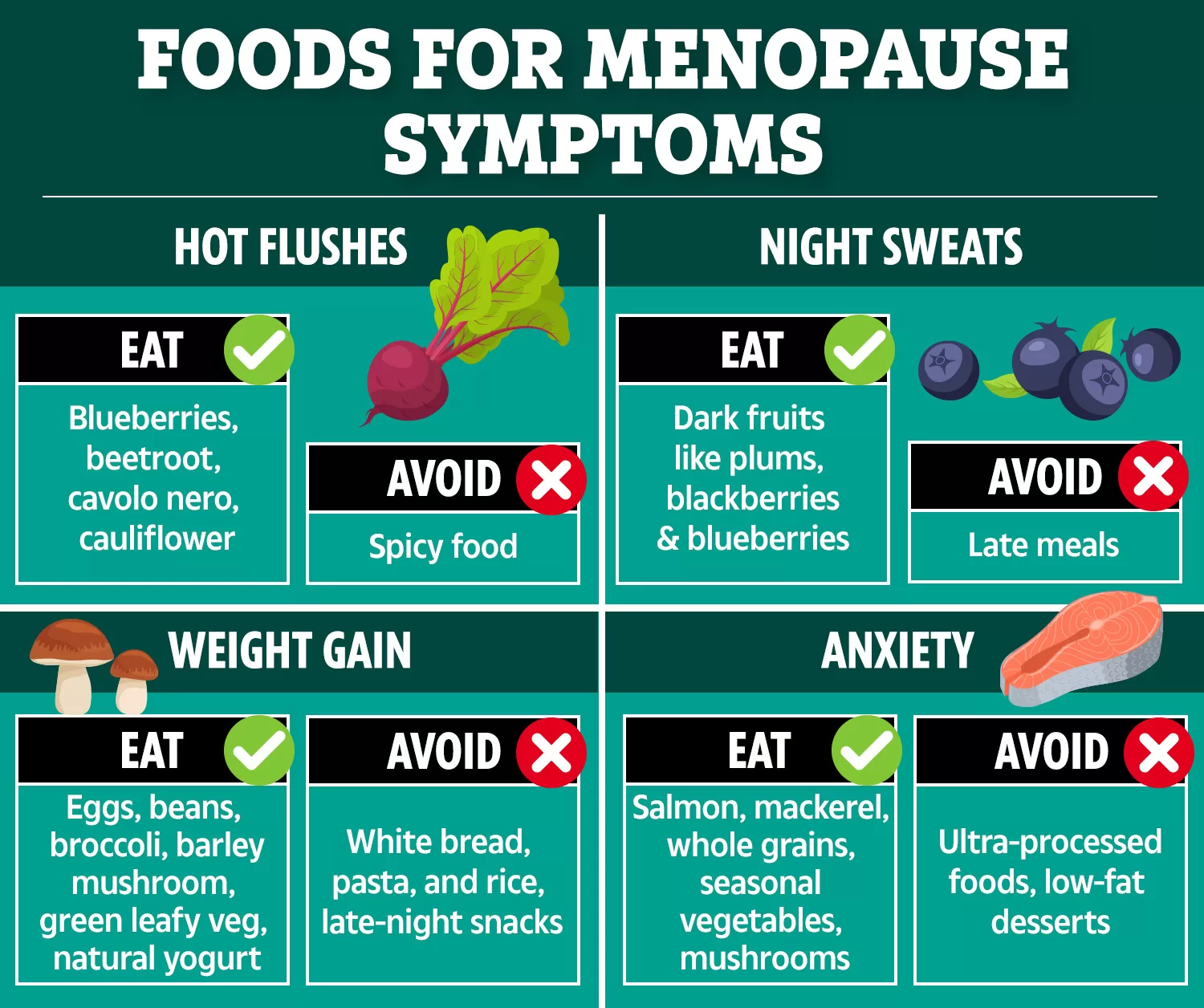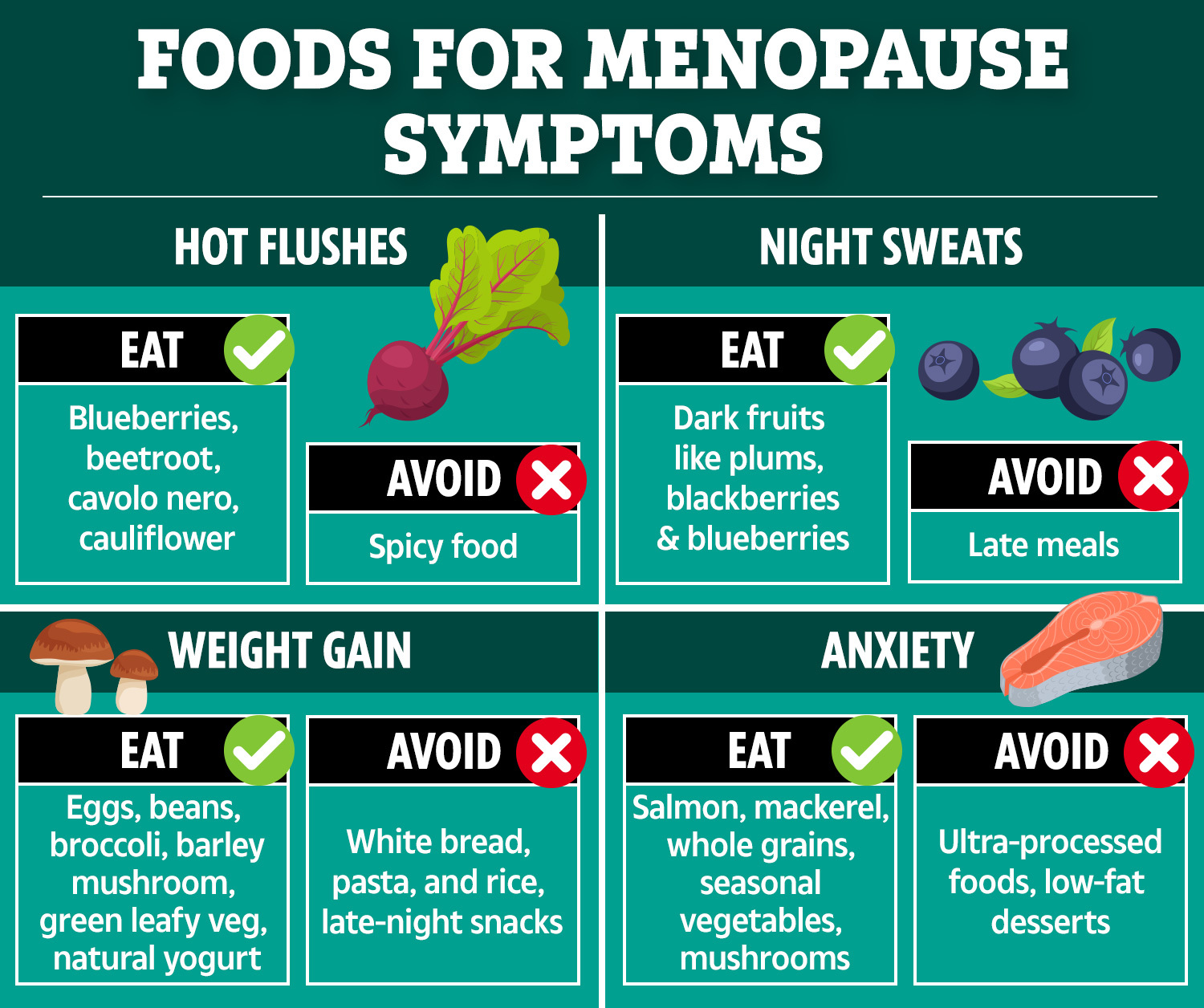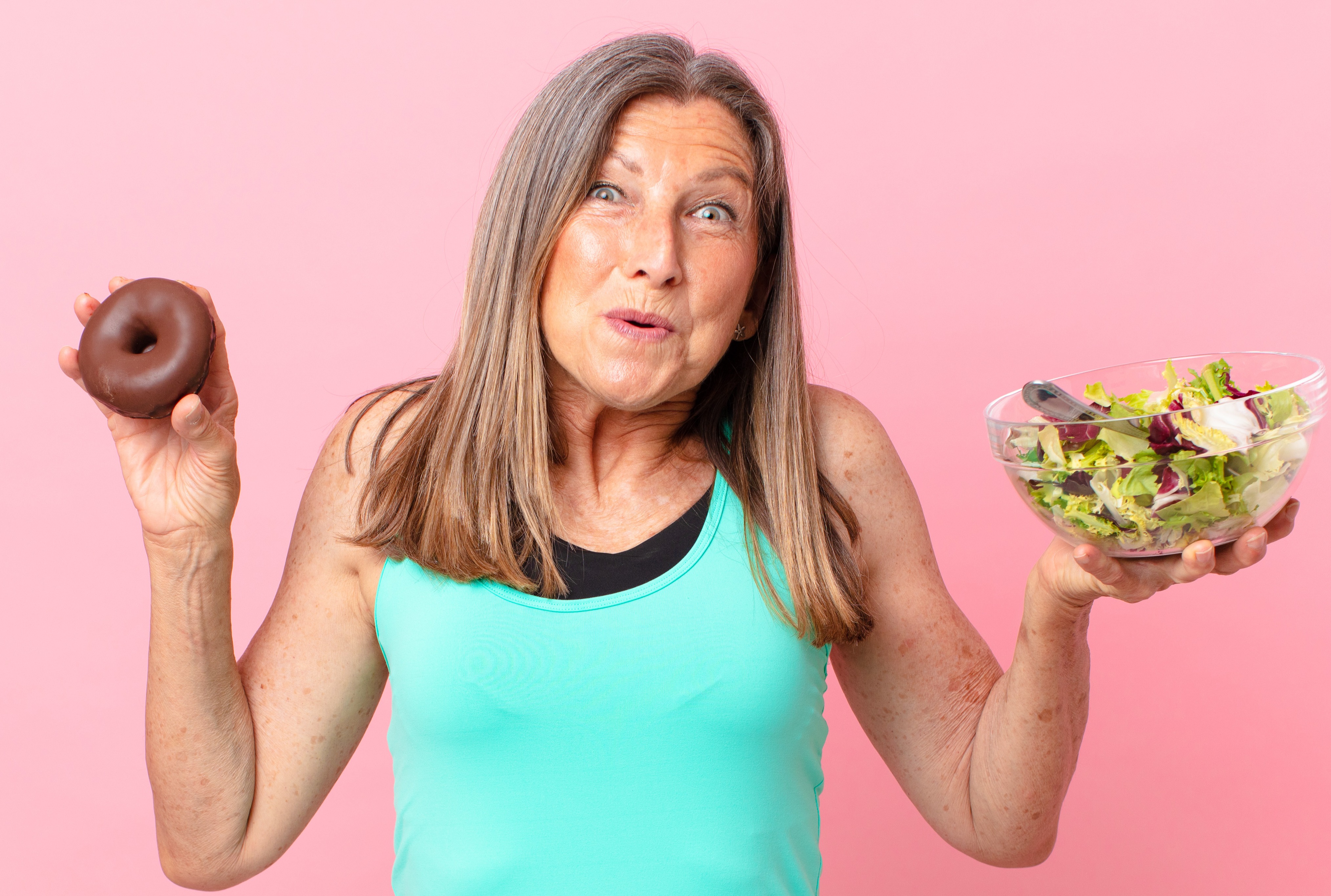Eating the ‘right’ things is a bit of a slog at the best of times.
But during the years of menopause it may be even more crucial.
While those suffering frequent urination should opt for more red cabbage, those needing more sleep should up the kiwis.
Alcohol is, sadly, best avoided for almost all menopause symptoms, as is ultra-processed food.
Dr Federica Amati, who wrote Recipes for a Better Menopause with Jane Baxter, tells Sun Health: “It’s becoming increasingly clear that diet can have a profound impact on the menopause.
“Nutrition is such a powerful tool and if we tweak our diet and lifestyle in the right way, we can make a significant impact on symptoms and on our long term health.
“In addition to diet, sleep, exercise, stress management all play a role in the menopause.”
Perimenopause, the years when hormones begin to decline but periods have not completely stopped, can start in early 40s.
Menopause – when a year since the last period has passed – is reached at age 51, on average.
It’s symptoms can last decades. Some women get hardly any symptom at all. Others may be crippled by them.
While every menopause is different, symptoms can be grouped in the following way:
Vasomotor symptoms
These symptoms are related to temperature dysfunction.
It’s what causes the most common issues of hot flushes and night sweats.
Hormonal
Decreased levels of oestrogen – the female sex hormone – cause low libido, weight gain and skin issues, above all else.
Metabolic
Changes in your hormone levels can lead to fluctuations in blood sugar response, which is related to cravings and hunger.
It may put women at higher risk of type 2 diabetes.
Inflammation
Inflammation can arise as a result of a number of changes. For example, if a woman is eating more due to cravings, it can increase weight and therefore inflammation.
Examples include skin changes but unchecked over time, it can cause joint stiffness and damage to organs.
Mental health
Changing hormones can trigger all sorts of symptoms that were not there before, including stress, anxiety and depression.
Day-to-day women may experience irritability or anger.
Women often report a loss of sense of self or identity, as a result of the changes they are experiencing.
Weight gain
Research at ZOE, a personalised nutrition company for which Dr Amati is head, has found evidence that women’s bodies respond more negatively to food when they are post-menopause, compared to pre-menopause.
“This was linked with excess weight and a higher risk of heart disease, along with greater sugar consumption and worse sleep,” she says.
It’s no wonder, then, that one of the more common side effects of menopause is the ‘meno middle’ – the extra weight that appears to come out of nowhere.
Eating foods high in added sugar and fats several times a day puts pressure on our metabolism. Nutrient-dense whole foods that are low in added sugar and fats is a way to avoid this.
Dr Federica Amati
Dr Amati says: “It’s important to recognise that putting on weight after the menopause is completely normal and very common.
“This is because hormonal shifts are causing your metabolism to change, meaning you will respond differently to foods.
“Weight gain and metabolism changes can be really challenging for many women to adjust to, but it’s about accepting that our bodies change throughout our lives; therefore, our nutrition should too.”
Dr Amati says to start by including whole foods in every meal of the day, whether it be a good helping of fruit or vegetables, beans or pulses, whole grains, nuts, seeds, or lean fish and meat.
This way of eating – similar to the Mediterranean diet, which is well-researched for its benefits – can also boost gut health.
“Looking after your gut health is really beneficial during this time,” Dr Amati says.
“Eating a diverse range of plants is key, as this will provide polyphenols and fibre that your gut microbes love.
“It’s also great to regularly include fermented foods, like kefir and live yoghurt, as these will help to support a thriving microbiome.”
You’ll want to try and limit processed foods, which may be putting more stress on the metabolism.
Dr Amati says: “For example, eating foods high in added sugar and fats several times a day puts pressure on our metabolism to clear, use and store both. So opting for nutrient-dense whole foods that are low in added sugar and fats is a way to avoid this.
“Rather than trying to change our metabolism, it’s about learning to work with it.”
What to eat for your symptoms
Vasomotor
Hot flushes
Eat: Blueberries, beetroot, cavolo nero, cauliflower
Avoid: Alcohol, spicy food
Night sweats
Eat: Dark fruits like plums, blackberries and blueberries
Avoid: Alcohol, late meals
Hormonal
Heart palpitations
Eat: Tofu, edamame
Avoid: Coffee, added sugars, biscuits and packaged snacks
Tip: Breathing exercises
Vaginal dryness
Eat: Extra virgin olive oil
Avoid: Refined carbohydrates (e.g. white bread, white pasta, white rice), fizzy drinks
Tip: Use topical oestrogen and a lubricant for sex, but avoid intimate soaps
Weight gain
Eat: Dark leafy greens, beans and legumes, chicken, tofu, mushrooms, eggs, broccoli, natural yogurt, barley
Avoid: Ultra-processed foods (those with five ingredients or more on the packet, even if they appear ‘healthy’), refined carbohydrates (e.g. white bread, white pasta, white rice), late night snacking
Poor sleep
Eat: Natural yoghurt, kiwi fruit
Avoid: Alcohol, spicy foods
Tip: Maintain a consistent sleep window
Changes in frequency of urination
Eat: Dark leafy greens, dark berries, red cabbage
Avoid: Alcohol, not drinking enough water
Inflammation
Stiff joints
Eat: Fresh spices, oily fish, extra virgin olive oil
Avoid: Refined carbohydrates (e.g. white bread, white pasta, white rice), alcohol
Skin changes:
Eat: Berries, dark leafy greens, chickpeas, collagen supplementation
Avoid: Alcohol, ultra-processed foods (those with five ingredients or more on the packet, even if they appear ‘healthy’)
Mental health
Anxiety
Eat: Salmon, mackerel, whole grains, seasonal vegetables, mushrooms
Avoid: Ultra-processed foods (those that five ingredients or more on the packet, even if they appear ‘healthy’), sugar-free and low-fat desserts
Loss of sense of self
Eat: Mushrooms, nuts, chickpeas, barley
Avoid: Ultra-processed foods (those with five ingredients or more on the packet, even if they appear ‘healthy’), alcohol
Mood changes
Eat: Dark fruits like plums, dark leafy vegetables
Avoid: Ultra-processed foods (those with five ingredients or more on the packet, even if they appear ‘healthy’), alcohol
Brain fog
Eat: Beetroot, dark chocolate, mushrooms, cherries and raspberries
Avoid: Refined carbohydrates (e.g. white bread, white pasta, white rice)
Overwhelm
Eat: Lentils, beans, tofu, chicken, nuts
Avoid: Caffeine, alcohol, refined carbohydrates (e.g. white bread, white pasta, white rice)
What is the menopause and how does it affect women?
The menopause is a transitional period all women go through in mid-life.
Hormones related to the reproductive system deplete namely oestrogen, over a period of time.
This doesn’t just cause periods to stop. Sex hormones act all over the body, from the brain, skin, vagina and more.
Therefore, dozens of symptoms affect all areas of the body, to varying degrees.
Women’s experiences of menopause vary greatly. While some breeze through it, others’ lives are significantly impacted. It can feel as though it lasts a couple of years, or for decades.
It cannot be predicted how each woman will fare.
When is menopause?
Perimenopause is when symptoms start but periods have not yet stopped, although they will be irregular. This can start in the early 40s.
Menopause is when periods have completely stopped for a year. The average age this happens is 51, but it can be any time from 45 to 55, according to the NHS.
The term ‘menopause’ is used to describe the experience overall.
Menopause before the age of 45 is called early menopause, affecting five per cent of women. Menopause before the age of 40 is called premature menopause, affecting one per cent of women before 40 and 0.1 per cent of women under 30.
This may happen for no clear reason, but also as a result of surgery, genetics or medications.
A year after that the final period, a woman is considered to be entering the post-menopausal stage.
How does it impact a woman’s life?
The menopause can be an extremely testing time in a woman’s life and for those around her.
The body is going through a significant change, and the symptoms that come with it can feel alien, with women sometimes describing a loss of sense of self.
Physical symptoms include hot flushes (a sudden feeling of heat in the face, neck and chest), difficulty sleeping, night sweats, heart palpitations, headaches, muscle and joint aches, weight skin, skin changes, reduced libido, vaginal dryness and more.
Symptoms affecting mental health or cognition include brain fog, memory loss, low mood, anxiety, low self-esteem and irritation.
There are ways to manage symptoms and cope with menopause – and women need to know that they are not alone in facing it.
Medication, such as HRT or oestrogen gel, can help attack the symptoms.
However, experts often say it needs a rounded approach incorporating good lifestyle habits, such as a balanced diet and less alcohol.
Many women report that their life began after menopause after it drew them to a healthier way of living.
However, the huge burden it can have – on work, family life and more – is important for society to recognise, as adapting policies at work, for example, can make it easier for women to stick with their job.
Read more about menopause on The Sun’s Fabulous Menopause Matters campaign.


